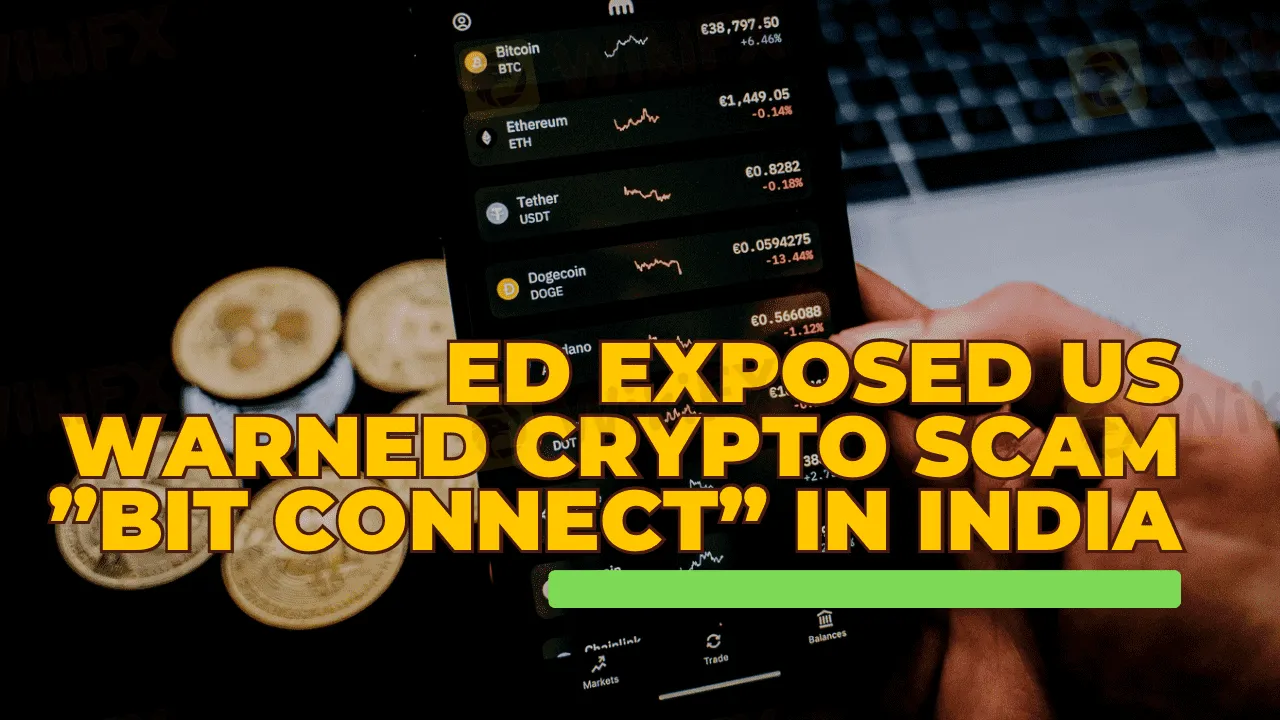简体中文
繁體中文
English
Pусский
日本語
ภาษาไทย
Tiếng Việt
Bahasa Indonesia
Español
हिन्दी
Filippiiniläinen
Français
Deutsch
Português
Türkçe
한국어
العربية
ED Exposed US Warned Crypto Scam ”Bit Connect”
Abstract:The Indian Enforcement Directorate (ED) recently exposed a crypto scam from Bitconnect. The investigation took place between February 11th and 15th, 2025. The authority recovered bitcoin worth approximately Rs 1,646 crore & Rs 13.50 lakh in cash, a Lexus car, and digital devices. This investigation was conducted under the provisions of the Prevention of Money Laundering Act (PMLA) of 2002.

The Indian Enforcement Directorate (ED) recently exposed a crypto scam from Bitconnect. The investigation took place between February 11th and 15th, 2025. The authority recovered bitcoin worth approximately Rs 1,646 crore & Rs 13.50 lakh in cash, a Lexus car, and digital devices. This investigation was conducted under the provisions of the Prevention of Money Laundering Act (PMLA) of 2002.

How did ED reach out to this scam?
After receiving FIRs from the Surat Police Station's Crime Investigation Department, the ED started an investigation. According to the FIR, Bitconnect's founder, Satish Kumbhani, and his colleagues created a plan known as the 'lending program.' Between November 2016 and January 2018, the scammers guaranteed a huge return of 40%. Investors around the world were attracted to this scam and invested in this scheme.
The main culprit, Satish Kumbhani, and his group enticed investors by claiming that a volatility software trading bot would manage funds. They even showed fictitious returns on its website, suggesting annualized gains of 3,700%.

The authority said the network of transactions was purposefully hidden by various crypto wallets and dark web transactions. Agents were capable of identifying the main digital wallets and finding the location where the illicit money was kept.
But ED revealed there is no such bot that exists. “ED investigation revealed that during the period from November 2016 to January 2018, Satish Kumbhani, the promoter of Bitconnect Coin (a cryptocurrency), established a worldwide network of promoters and induced the public to invest in various investment schemes related to Bitconnect Coin by offering huge returns,” said a senior ED official.
In 2022, the US Securities and Exchange Commission (SEC) warned against Bitconnect and its scheme “Landing Program.”

Disclaimer:
The views in this article only represent the author's personal views, and do not constitute investment advice on this platform. This platform does not guarantee the accuracy, completeness and timeliness of the information in the article, and will not be liable for any loss caused by the use of or reliance on the information in the article.
Read more

Why Your Stop Loss Keeps Getting Hit & How to Fix It
Many new traders run into the same frustrating problem. They analyse the market, place a trade, and watch the price go against them just enough to hit their stop loss. Then, like a bad joke, the price moves exactly in their predicted direction. Read this article to learn how to fix this issue for good!

Safe-Haven Surge: Gold Shines Amid Market Turmoil
Rising geopolitical tensions fuel a flight to safety, propelling gold past key resistance and positioning it as a top-performing asset in today’s volatile market.

Important Statement on the Authenticity of WikiFX Score and Broker Reviews
WikiFX is committed to enhancing transparency and security in the forex industry through technological means and publicly available data. We firmly believe that fair information disclosure and a scientific evaluation system can genuinely safeguard investors’ rights and boost the healthy development of the industry.

Trade Nation vs. HYCM: Which Broker Should You Choose?
When it comes to online forex trading, picking the right broker can make a big difference. Two popular choices, Trade Nation and HYCM, that offer different features, rules, and trading conditions. Both are regulated by financial authorities, but they follow different approaches in areas like fees, trading tools, and customer support. This comparison helps traders understand which platform might suit their needs better.
WikiFX Broker
Latest News
Safe-Haven Surge: Gold Shines Amid Market Turmoil
Why Your Stop Loss Keeps Getting Hit & How to Fix It
Indian "Finfluencer" Asmita Patel Banned: SEBI Slaps Charges on Her Company, AGSTPL
HDFC Bank's Green Push: Empowering 1,000 Villages with Solar Energy
MetaQuotes Rolls Out MT5 Build 5120 with Enhanced Features and Stability Fixes
Advantages of Using EA VPS for Trading - Detailed Guide
$1.1 Million Default Judgement Passed Against Keith Crews in Stemy Coin Fraud Scheme
How Money Moves the World | Why Finance Matters for Everyone
IG Japan Issues Trading Alert as Israel‑Iran Tensions Escalate
Investor Alert: SEBI Introduces New UPI Safety Net Against Scam Brokers
Currency Calculator


